高中英语必修2(外研版)unit1ourbodyandhealthyhabits知识点总结
- 格式:docx
- 大小:20.50 KB
- 文档页数:10
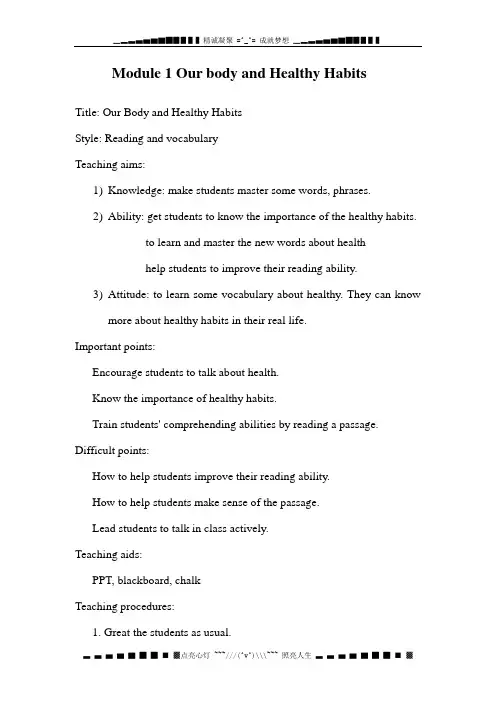
Module 1 Our body and Healthy HabitsTitle: Our Body and Healthy HabitsStyle: Reading and vocabularyTeaching aims:1)Knowledge: make students master some words, phrases.2)Ability: get students to know the importance of the healthy habits.to learn and master the new words about healthhelp students to improve their reading ability.3)Attitude: to learn some vocabulary about healthy. They can knowmore about healthy habits in their real life.Important points:Encourage students to talk about health.Know the importance of healthy habits.Train students' comprehending abilities by reading a passage. Difficult points:How to help students improve their reading ability.How to help students make sense of the passage.Lead students to talk in class actively.Teaching aids:PPT, blackboard, chalkTeaching procedures:1. Great the students as usual.Step 1. Lead-in1. This morning i'm very busy, I have no time to eat. Would you like to give me some advice about healthy food to eat?2. Show the pictures on the screen and ask students which food do they like best, Chinese food or Western food?Step 2. Pre-readingV ocabulary: let the students look at these words on the screen and answer the questions.Suggested answersStep 3. Fast-reading1. Zhou Kai (1)1) let the students look at the picture of Zhou Kai and ask the students to guess the characters of the boy.2). Ask students to read Zhou Kai (1) and try to answer the following questions individually.1).Why is Zhou Kai' s mother anxious?2). What does she think will happen?3). What does she ask him to do?Suggested answers:1).Because he is going out to play football in the rain.2).She thinks Zhou Kai will catch a bad cold.3).She asks him to at least wear his jacket.2. The students are required to draw a flow chart about how Zhou Kai caught a cold?3. Zhou Kai (2)1.Ask students to skim the passage and try to answer the following questions:1).How are Passage 1 and 2 connected?2).Does Zhou Kai have a healthy lifestyle, in your opinion? Suggested answers:1). They are connected because they both mention that he got ill through playing football in the rain.2). Yes, Zhou Kai has a healthy lifestyle because his mother gives him lots of fresh fruit and vegetables. He eats fish, not fatty meat or sugar and sweets. He also exercises regularly, playing a lot of football.2. Ask students to march the topic sentence of each paragraph.3. Students are encouraged to read the passage and choose the correct answers.1.Zhou Kai's family _________.(a) avoid eating too much fat or sugar(b) eat a lot of vegetables, fruit and meat2. Zhou Kai ________________.(a) sometimes gets colds and flu(b) seldom gets colds or flu3. A week ago, Zhou Kai _________.(a) caught a cold (b) injured his arm4. Two years ago, Zhou Kai _______.(a) hurt his leg (b) hurt his arm5. Zhou Kai describes himself as ___.(a) crazy (b) someone who loves footballSuggested answers:1.a2.b3. a4. b5. BStep 4. Post - reading1. Do a interview in pairs:According to Zhou Kai (2): suppose you are a reporter, the other one is Zhou Kai . You want to ask something about his healthy lifestyle.2. DiscussionDiscuss with your partner about How to stay healthy?Step 5. Summary and homework1. Ask the students what we learnt today and summarizes the contents of this class.2. Homework:1)Revise the vocabulary we have learnt.2)Search the internet for more information about how to keep healthy. Write a passage about it.。
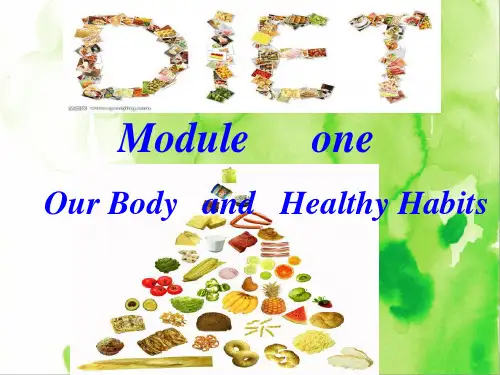

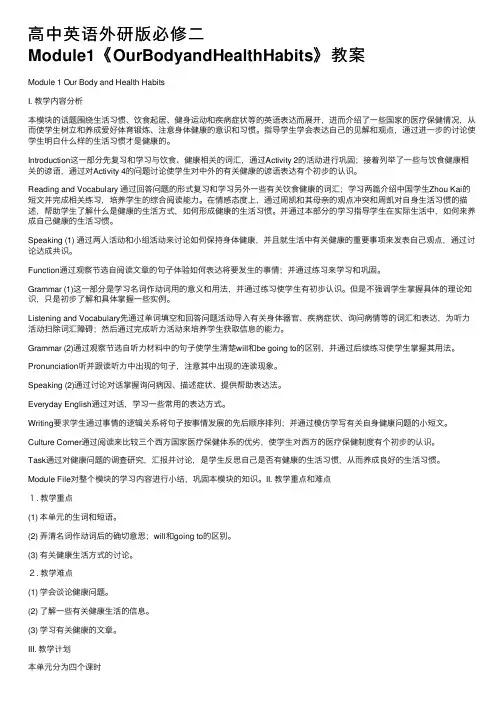
⾼中英语外研版必修⼆Module1《OurBodyandHealthHabits》教案Module 1 Our Body and Health HabitsI. 教学内容分析本模块的话题围绕⽣活习惯、饮⾷起居、健⾝运动和疾病症状等的英语表达⽽展开,进⽽介绍了⼀些国家的医疗保健情况,从⽽使学⽣树⽴和养成爱好体育锻炼、注意⾝体健康的意识和习惯。
指导学⽣学会表达⾃⼰的见解和观点,通过进⼀步的讨论使学⽣明⽩什么样的⽣活习惯才是健康的。
Introduction这⼀部分先复习和学习与饮⾷、健康相关的词汇,通过Activity 2的活动进⾏巩固;接着列举了⼀些与饮⾷健康相关的谚语,通过对Activity 4的问题讨论使学⽣对中外的有关健康的谚语表达有个初步的认识。
Reading and Vocabulary 通过回答问题的形式复习和学习另外⼀些有关饮⾷健康的词汇;学习两篇介绍中国学⽣Zhou Kai的短⽂并完成相关练习,培养学⽣的综合阅读能⼒。
在情感态度上,通过周凯和其母亲的观点冲突和周凯对⾃⾝⽣活习惯的描述,帮助学⽣了解什么是健康的⽣活⽅式,如何形成健康的⽣活习惯。
并通过本部分的学习指导学⽣在实际⽣活中,如何来养成⾃⼰健康的⽣活习惯。
Speaking (1) 通过两⼈活动和⼩组活动来讨论如何保持⾝体健康,并且就⽣活中有关健康的重要事项来发表⾃⼰观点,通过讨论达成共识。
Function通过观察节选⾃阅读⽂章的句⼦体验如何表达将要发⽣的事情;并通过练习来学习和巩固。
Grammar (1)这⼀部分是学习名词作动词⽤的意义和⽤法,并通过练习使学⽣有初步认识。
但是不强调学⽣掌握具体的理论知识,只是初步了解和具体掌握⼀些实例。
Listening and Vocabulary先通过单词填空和回答问题活动导⼊有关⾝体器官、疾病症状、询问病情等的词汇和表达,为听⼒活动扫除词汇障碍;然后通过完成听⼒活动来培养学⽣获取信息的能⼒。
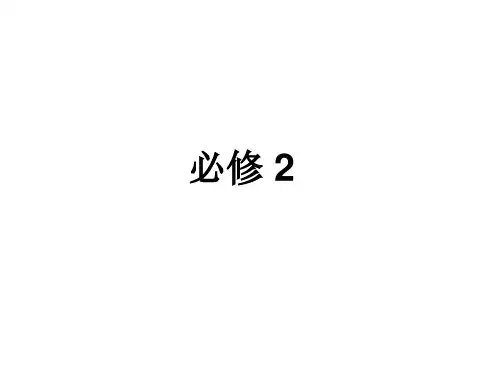
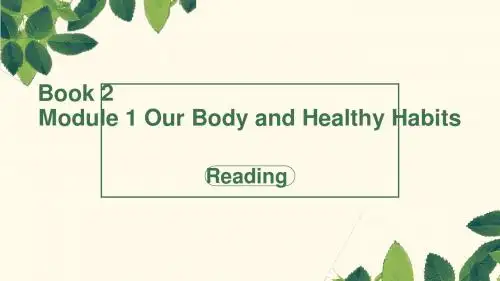
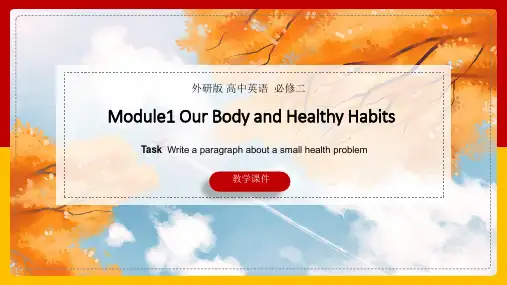
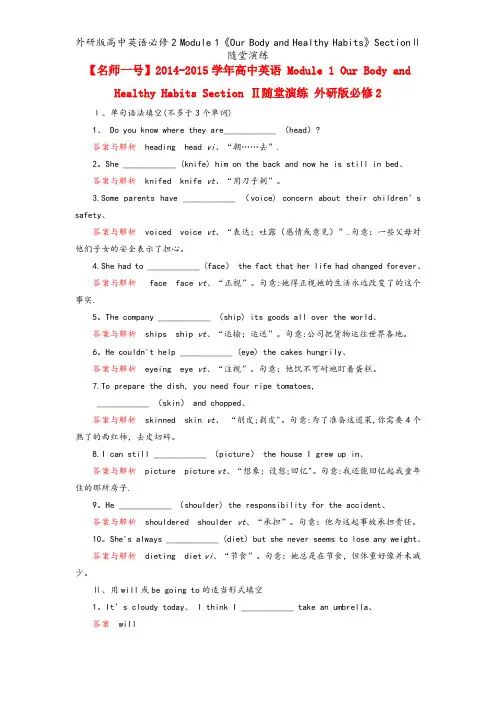
【名师一号】2014-2015学年高中英语 Module 1 Our Body and Healthy Habits Section Ⅱ随堂演练外研版必修2 Ⅰ、单句语法填空(不多于3个单词)1、 Do you know where they are____________ (head)?答案与解析heading head vi、“朝……去”.2。
She ____________ (knife) him on the back and now he is still in bed、答案与解析knifed knife vt、“用刀子刺”。
3.Some parents have ____________ (voice) concern about their children’s safety、答案与解析voiced voice vt、“表达;吐露(感情或意见)”.句意:一些父母对他们子女的安全表示了担心。
4.She had to ____________ (face) the fact that her life had changed forever、答案与解析 face face vt、“正视”。
句意:她得正视她的生活永远改变了的这个事实.5。
The company ____________ (ship) its goods all over the world、答案与解析ships ship vt、“运输;运送”。
句意:公司把货物运往世界各地。
6。
He couldn't help ____________ (eye) the cakes hungrily、答案与解析eyeing eye vt、“注视”。
句意:他饥不可耐地盯着蛋糕。
7.To prepare the dish, you need four ripe tomatoes,____________ (skin) and chopped、答案与解析skinned skin vt、“削皮;剥皮"。
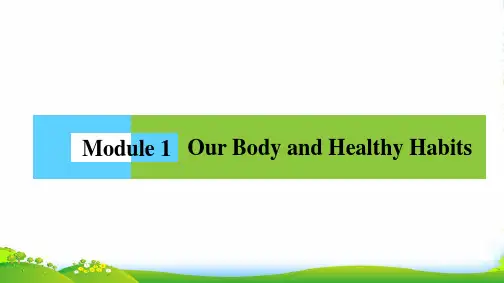
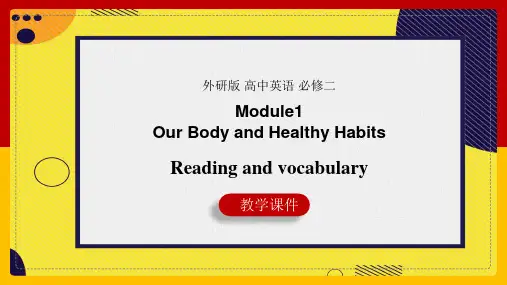

Module 1 Our Body and Healthy Habits【重点单词】1. adj. 罕见的;珍奇的→adv. 很少地,罕有地→rareness n. 稀奇;珍贵2.unhealthy adj. 不健康的,不卫生的→ adj. 健康的,卫生的→n. 健康3. adj. 富裕的→wealth n. 财富4. adj.忧虑的;焦虑的,不安的;渴望的→anxiety n. 焦虑,忧虑5. vt.损害,伤害→injury n. 损伤,毁坏→ adj. 受伤的6.pain n. 痛苦,疼痛;辛苦,努力(常用复数)v. 使痛苦;疼痛→ adj. 令人疼痛的;令人痛苦的;疼的→painless adj.无痛的;不引起痛苦的7. adj. 正常的,正规的n. 正常状态→abnormal adj. 不正常的8.overweight adj. 超重的,肥胖的→v. 重,称重,权衡→n. 重量, 体重9. v. 呼吸,呼气→breath n. 呼吸,气息,一口气10. adj. 吓人的; 糟糕的, 难受的→ adv. 非常→awfulness n. 糟糕, 恶劣, 难受【重点短语】1.至少2.朝……前进 3.生病了4.一周四次 5.患感冒6.宁愿7.喜欢甜食8.进行锻炼9.对……着迷10.发烧11.不上班12.支付……的费用【重点句型】1.I ___________________________ a week. 我每周至少锻炼两个小时。
2.When Zhou Kai's mother saw him ______________ the front door _________________, she _____ him anxiously. 当周凯的妈妈看到他没穿夹克往外走的时候,她焦虑地看着他。
3. ________________ I was ______________ play football in the rain.那是因为我很傻,竟然冒雨踢足球。
高中英语必修2(外研版)Unit 1 Our Body and Healthy Habits知识点总结一、重点辞汇四者都可以指“伤害、伤痛”。
Drinking can injure one's health.饮酒对人的健康有害。
I'm sorry I hurt you; I didn't mean to.对不起,我弄伤了你;我不是故意的。
The robber wounded him with a knife.那个强盗用刀刺伤了他。
How did you get that cut on your hand?你手上的伤口是怎么弄的?这四个词都有“普通的”、“常见的”意思。
其区别是:It's normal to feel tired after such a long trip.远程旅行后感到累是很正常的。
His name was Hansen, a common name in Norway.他的名字叫汉森,在挪威是一个常见的名字。
As a general rule, prices follow demands.一般而言,物价随需求而转变。
Now electrical appliances have entered into ordinary families.此刻,家用电器已经步入普通家庭。
diet n.饮食;节食1. a healthy/balanced diet:健康的/均衡的饮食2. go/be on a diet:用规定食谱;节食You don't have to go on a diet to lose weight.你不需要靠节食来减肥。
1. be anxious about sth.:为…担忧,忧虑2. be anxious for sth.:渴望…3. be anxious to do sth.:急于,渴望做某事I am anxious about the parcel because it hasn't arrived. 我对这包裹很担忧,因为它还没到。
The whole country was anxious for peace.全国上下都渴望和平。
She was anxious to finish school and get a job.她渴望毕业找一份工作。
He's still crazy about both his work and his hobbies. 他对工作和个人爱好仍然维持狂热。
The teacher began his class with a question.老师以一个问题开始他的讲课。
He got injured through his own carelessness.他由于粗心受伤了。
In large cities people breathe in dangerous gases from cars and chimneys.在大城市人们呼吸时吸入汽车和烟囱排出的有害气体。
Mr. Smith needs more exercises to keep fit.(keep fit:维持健康)史密斯先生需要更多的锻炼以维持身体健康。
He's been ill and isn't fit for work yet. (be fit for:适合…)他一直在生病,尚不能工作。
This new jacket fits her well.这件茄克很合她的身。
The ship came about and headed for the shore.轮船调转般向朝海岸驶去。
拓展:英语中有些名词可转化为动词,如:eye n. 眼睛v.(用眼睛看)注视;端详face n. 脸 v. 面对picture n. 照片,影片 v. 画;拍照dress n. 礼服 v.打扮,穿衣rare adj. 稀少的;罕有的rarely adv. 罕有地wealthy adj. 富裕的overweight adj. 太胖的;超重的symptom n. 症状insurance n. 保险questionnaire n. 问卷调查awful adj. 糟糕的;恐怖的;充满敬畏的become ill 生病have a temperature 发烧put…into… 将…投入/放入…take exercise 锻炼lie down 躺下二、重点句型解析:本句的骨干是“I’m a normal kind of person”;“as you can see from what I’ve said”是由as引导的一个定语从句;what引导的是from的宾语从句。
翻译:因此,正如你能从我所说的看到的一样,我只是一个普通人。
拓展:as引导的定语从句在写作中应用相当普遍,常见的结构有:“as is known to all…”; “as we all know…”意思都是“众所周知…”。
解析:本句的骨干是“I make sure that …and this isn’t a problem”,由and连接一个并列句。
“that I have a gooddiet” 是make sure的宾语从句,“Because of this”是一个介词结构,表示原因;“as I’ve said”是一个定语从句,修饰“this isn't a problem”;because引导的是一个原因状语从句。
翻译:因此,我得确保合理膳食;而且正如我前面所说,合理膳食并非是一个问题,因为我母亲把咱们照顾得很好。
解析:本句的骨干是“Britain was the first country in the world…”;“to have a free health care system”是动词不定式结构作定语,修饰前面的country;“paid for the by the government”是过去分词结构作定语,修饰前面的system。
翻译:英国是世界上第一个拥有免费医疗系统的国家,整个医疗体系都是由政府资助的。
拓展:非谓语作定语在写作中应用相当普遍,有时简单的定语从句可以考虑利用非谓语来代替,这样可使语言精练地道,例如:The boy whose name is Tom is popular with his classmates.The boy named Tom is popular with his classmates.解析:本句的骨干是“They see doctors and pay the doctors”;who引导的是一个定语从句,修饰前面的doctors;through引导的是一个介词结构,表示方式。
翻译:他们看自己的专属医生,并通过医疗保险公司进行支付。
三、重点语法含义:词的转化(conversion)是英语构词法中的主要方式之一。
它指的是一个词不改变词形,而由一种词类转化成另一种或几种词类。
本模块学习名词转化为动词的用法。
名词转化为动词是现代英语中很普遍的现象,同时也是转化构词中最活跃的一种。
人们常常把名词不加任何改变就看成动词利用。
用法:很多表示物件(如下1)、身体部位(如下2)、某类人(如下3)的名词可以用作动词来表示动作,某些抽象名词(如下4)也可作动词。
例如:1. Did you book a seat on the plane?你订好飞机座位了吗?2. We set sail at dawn and headed for New York.咱们在黎明启程,直驶纽约。
3. She nursed her husband back to health.她看护丈夫,使他恢复了健康。
4. We lunched together.咱们在一路吃了午饭。
体会更多名词用作动词的例子,看你能准确地理解名词动词化后的词意吗?1. He's always bossing his wife about.2. The escaped prisoner was cornered at last.3. Stop mothering her, she’s 30 years old and can take care of herself perfectly well.4. People were streaming out of the station.5. I did not like the way he eyed me.6. Mr. Smith noons for half an hour every day.7. He doesn't have all ideas of his own. He just parrots what other people say.答案揭晓:1. boss around 颐指气使;把…呼来唤去2. corner 将…逼入窘境3. mother 像母亲一般地照料4. stream 涌出;川流不息;蜂拥5. eye 看;定睛地看6. noon 午休7. parrot 学舌;盲目重复或仿照除名词转化为动词外,还有副词,连词等转化为动词,动词转化为名词,形容词副词等转化为名词。
如:We downed our coffee and left.咱们喝完咖啡就离开了。
(down 常为副词,意为“向下”,这里作动词,意为“喝下”)The old in our village are living a happy life.咱们村的老年人过着幸福的生活。
(old常作形容词,这里作名词,the old 意为“老人”)Let's go out for a walk.咱们到外面去散散步吧。
(walk常作动词,这里用作名词,意为“散步”)We will try our best to better our living conditions.咱们要尽力改善咱们的生活状况。
(better常作形容词,这里作动词,意为“改善”)本单元学习will和be going to表示“将要”。
表示“将要”1. ---“Kate is in hospital.”---“Oh, really, I didn't know. I will go and see her at once.”(临时决定去看Kate)。
2. ---“Kate is in hospital.”---“Yes, I know. I am going to see her this afternoon.”(提前已打算好去看Kate)拓展:1. 推测,揣想:I think it will be rainy tomorrow.我以为明天有雨。